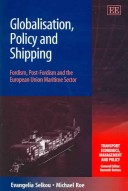Transport Economics, Management and Policy
1 total work
The book concentrates on the issue of shipping policy and the relationships between policymakers and policy-enforcers at different spatial levels - international, supra-national and national. In an increasingly global sector, where ship-owners, cargo-owners, ship registration and crew might all be based in different countries, the authors question the role and authority of national shipping policies and their relevance compared to the growing significance of supra-national bodies such as the European Union. They illustrate this with a detailed case study of EU shipping policy and an analysis of the role of different member states.
Models of shipping development and activity are also introduced which provide a useful basis for understanding the industry at the turn of the millennium. In particular, models derived from the Neo and Post-Fordism debate are examined with respect to the structure which underlies trends towards a globalised economy.
This book provides a unique discussion of shipping policy in theory and practice, and will become required reading for researchers and students with an interest in maritime policy, decision-making, political science and organisational theory. It will also be of significant interest to transport policymakers and shipping experts.
